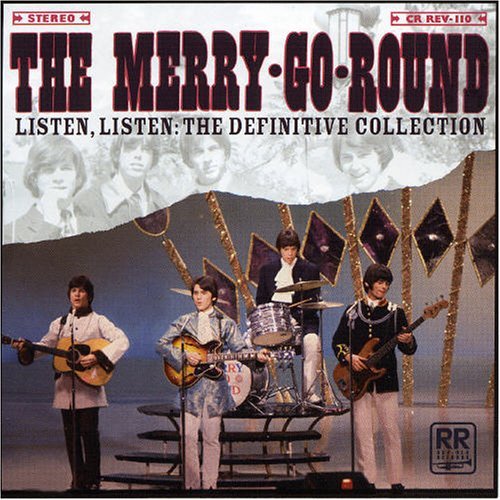

The Merry-Go-Round's Listen, Listen: The Definitive Collection is a near-perfect example of doing a reissue the right way. Lovingly put together by the folks at Rev-Ola, the package is a perfect blend of enlightenment and entertainment, with insightful liner notes that feature new interviews with many members of the group and their guiding light, Emitt Rhodes, excellent photos, clean and crisp sound, and best of all, the wonderful music of the Merry-Go-Round and Emitt Rhodes. First, some bookkeeping. The opening half of the disc contains the group's lone album released on A&M in 1967, The Merry-Go-Round, the second half is the Emitt Rhodes album released by A&M in 1970 (and also in '71 with a different cover and an altered track listing) called The American Dream. The album is made up of songs Rhodes cut with studio pros in 1969 after the demise of the group, as well as demos recorded in the latter days of the Merry-Go-Round. The package is rounded out by four songs taken from singles released after The Merry-Go-Round, the mono version with drums of "Time Will Show the Wiser," and as a bonus, the band's recording of "Good Vibrations" with A&M honcho Herb Alpert on lead trumpet. Now for the music. The Merry-Go-Round is a breathtaking blend of chiming folk-rock guitars, British Invasion harmony vocals, baroque pop arrangements, and pure pop songcraft that sounds daisy fresh in 2005. The Beatles are a huge influence, there is plenty of Paul McCartney in Rhodes' sweet vocals and their vocal harmonies. You can hear the Byrds a bit, some Left Banke (especially on the sweeping orchestral pop gem "You're a Very Lovely Woman"), some L.A. garage on rockers like "Where Have You Been All My Life" and "Lowdown"; the group definitely didn't exist in a vacuum. There are some songs, though, that are quite unique and original like "Time Will Show the Wiser" with its otherworldly sped-up and backwards guitars and enchanting melody; the warm and bouncy hit single "Live," and "Had to Run Around" an exquisite ballad whose tender beauty foreshadows Rhodes' classic 1970 Emitt Rhodes album. These songs, and the overall quality of the songs and the group's loose and earthy playing, help lift the album above the pack and should lead to it being mentioned in the same breath as Love's first album or Buffalo Springfield's first when talking about classic American debut albums of the '60s. The singles included on the reissue show the band adding piano and a fuller sound, not too surprising since many of the tracks on the album were demos. They are fine songs, too; 1968's "Sgt. Pepper's Lonely Heart's Club Band"-inspired "Listen, Listen" rocks harder than anything else they recorded and has one of Rhodes' most intense vocals; "She Laughed Loud" is a self-mocking tune with some great background vocals, and "Missing You" incorporates some lovely harpsichord and was unjustly buried as a B-side. The American Dream album features some of Rhodes' best songs, like the rollicking Harry Nilsson-esque "Holly Park," the catchy as the flu, should-have-been a hit "Let's All Sing," and a couple of tracks that sound like the blueprint for the sound of Rhodes' first real solo album: the simple and beautiful "Saturday Night" and "Pardon Me." It also features a couple of semi-clunkers in the hokey Appalachian narrative "Textile Factory," the overly dramatic "Someone Died," and the calypso-inflected "Mary Will You Take My Hand." The use of studio musicians also tends to drain most of the homespun charm of the MGR's work and the grafted-on string and horn arrangements on some of the songs can veer to the point of schmaltz ("Come Ride, Come Ride," "The Man He Was"). When you strip away the excess sweetening, though, the record is at its heart a solid pop record, not up to the standard of what preceded it or what followed, but most certainly worth hearing, and it's obviously a must for fans of Rhodes, too, but more than that, the fact that it marks the first time the entire Merry-Go-Round discography is available on CD makes it an absolute must for fans of sophisticated '60s pop. In a world of botched reissues and pointless collections, Rev-Ola gets it right. Well done, lads.